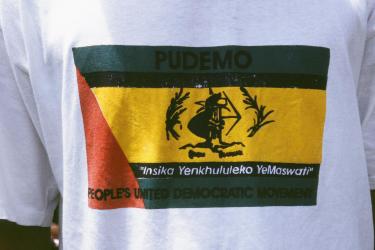The Congress of South African Trade Unions (COSATU) is humbled by the inspirational messages from all over the world for our boycott, sanctions and divestment campaign against Israel.
COSATU

Congress of South African Trade Unions and Palestine Solidarity Committee (South Africa)
[See http://links.org.au/node/888 for more background information.]
February 6, 2009 -- The Congress of South African Trade Union (COSATU) is pleased to announce that its members, dock workers belonging to the South African Transport and Allied Workers Union (SATAWU), achieved a victory last night when they stood firm by their decision not to offload the Johanna Russ, a ship that was carrying Israeli goods to South Africa. This, despite threats to COSATU members from sections of the pro-Israel lobby, and despite severe provocation.

FREE PALESTINE! ISOLATE APARTHEID ISRAEL!
The Congress of South African Trade Unions (COSATU) and Palestine Solidarity Committee (PSC) launch Week of Action for Palestine supported by the Young Communist League and other progressive organisations
February 3, 2009 -- In a historic development for South Africa, South African dock workers have announced their determination not to offload a ship from Israel that is scheduled to dock in Durban on Sunday, February 8, 2009. This follows the decision by COSATU to strengthen the campaign in South Africa for boycotts, divestment and sanctions against apartheid Israel.
The pledge by the South African Transport and Allied Workers Union (SATAWU) members in Durban reflects the commitment by South African workers to refuse to support oppression and exploitation across the globe.
January 20, 2009 -- In a few hours, Barack Hussein Obama will be sworn in as president o

Protesters call for boycott of apartheid Israel, Johannesburg, January 2, 2009.
By Zwelinzima Vavi, general secretary, Congress of South African Trade Unions (COSATU)
January 14, 2009 -- From our own experience, we know how painful and dehumanising is the system of segregation, otherwise known as apartheid. Apartheid is a system based on the assumption that one group or race is superior to others and therefore has a right to all the privileges and virtues associated with that particular status. It has a right to run and determine the lives of others, excluding them from certain privileges, merely because they do not belong to the “chosen” group.
What other definition would so fittingly define a system based on different rights and privileges for Jews and Arabs in the Middle East? The bantustanisation of Palestine into pieces or strips -- West Bank, Ramallah, Gaza Strip and so on -- run by Israel and with no rights whatsoever for the Palestinians, is definitely an apartheid system.
Below Links International Journal of Socialist Renewal publishes a range of statements from left parties and groups around the world. More will be added as they come to hand.
* * *
Respect's George Galloway on January 8, 2009, addresses a London meeting organised by the Palestine Solidarity Campaign

December 27 demonstration in Bethlehem against the massacre in Gaza (Photo: Ghassan Bannoura-IMEMC)
By the Palestinian Boycott, Divestment and Sanctions National Committee
Occupied Ramallah, Palestine -- December 27, 2008 -- Today, the Israeli occupation army committed a new massacre in Gaza, causing the death and injury of hundreds of Palestinian civilians [latest reports place the death toll at more than 200], including a yet unknown number of schoolchildren who were headed home from school when the first Israeli military strikes started. This latest bloodbath, although far more ruthless than all its predecessors, is not Israel's first. It culminates months of an Israeli siege of Gaza that should be widely condemned and prosecuted as an act of genocide against the 1.5 million Palestinians in the occupied coastal strip.
By Patrick Bond
September 21, 2008 -- The past week has been a wild roller-coaster ride in and out of Southern African ruling-party politics, down the troughs of world capitalism, and up the peaks of radical social activism. Glancing around the region and the world from those peaks, we can see quite a way further than usual.
Looking first to South Africa, September 20's dumping of state president Thabo Mbeki by Jacob Zuma -- president of the African National Congress (ANC) -- and his temporary replacement (until next April 2009's election) by ANC deputy president Kgalema Motlanthe, was an excellent reflection of ruling elite fragility in neoliberal regimes. Some of Mbeki's main supporters, including Mbhazima Shilowa, the former trade union leader and now premier of Gauteng province, in the economic heartland of Johannesburg -- are apparently considering the launch of a competing party.
Two speeches by leaders of the Peoples United Democratic Movement (PUDEMO -- Swaziland's liberation movement) on the developing struggle for democracy and social justice in the small southern African country of Swaziland. Mario Masuku is president of PUDEMO; Bongani Masuku is a former secretary general of the Swaziland Solidarity Network and is the Congress of South African Trade Unions' international secretary.
June 2008 -- The township of Alexandra outside Johannesburg, South Africa, has a long history of resistance to oppression and exploitation.
See also ``Xenophobia tears apart South Africa's working class'' by Thandokuhle Manzi and Patrick Bond.
Watch South Africa: The New Apartheid, on the South African government's treatment of migrant workers and refugees and the involvement of racist white farmers.
* * *
May 21, 2008 -- According to the UN Integrated Regional Information Networks, as of May 19, 2008, the death toll in a wave of attacks targeting foreigners around South Africa's main city of Johannesburg has risen to at least 32, with an estimated 6000 people seeking shelter in police stations, churches and community halls. The violence has spread to Zandspruit, northwest of Johannesburg, and Tembisa, Primrose, Reiger Park and Thokoza, on the eastern perimeter of the city, as well as other working-class communities.

